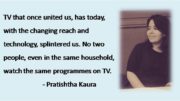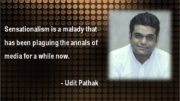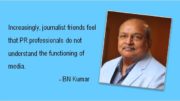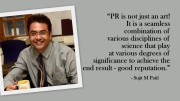You are as good as your list. That’s a statement that young communicators often face in their early years of profession. And mark my words, it not just the PR professionals who feel the same or face the same. Journalists too bear the same burden. In fact, there was a time back in my nascent years of reporting when I actually believed it. But time changed it all. Experience taught many lessons. Sharing few…
Nothing starts without a list
Just a list, a database, some numbers to dial and ids to mail is not good enough but then fact of the matter is, you can’t start at all without a list in hand. That’s the first step. More the updated and extensive, better the foundation.
Relationship is the key
Next step is the relationship. It’s inevitable and necessary to have a relationship between a communicator and media. Ones consistent and persistent efforts with an element of beyond-business personal touch will determine if the relationship is good or bad.
Universal communication
The communication from the organisation should remain constant and universal. With the change of the spokesperson or the audience (read media) the message should not alter. The tone, tenor and communication is supposed to remain same at all cost.
Silence not an option
No bona fide media query should go unanswered. “No comments” is never the best option. There are numerous ways of dodging the question and finding way out. Experts, in fact, turn around those questions into opportunity and respond with their own communication going out louder.
The questions may be pricky at times. But then that’s how they are supposed to be. A hitting question doesn’t make media your anti. That’s again an opportunity. Appreciate the reporter for good question, flatter them with compliments and smartly convince them. They’ll prove to be allies in long run.
Be accountable
The moment an organisation recognises its accountability towards publics – its stakeholders, half the battle is won. Now reaching out to the publics is the next step. That’s where the role of media comes into play. It acts vehicle to communicate with the publics and manage reputation.
Media may at times come with an agenda. Don’t fall prey to it. Alongside don’t try to control it. Highlighting aspects is good but trying to dictate to media what’s newsworthy and what’s not is never a good idea. Best way is to add to their agenda and go with the flow.
Professional support – ice breaker
Providing professional support to the journalists in doing their duty acts as an ice breaker. Assistance in route guidance, parking spots, access, media space, wi-fi, etc. brings warmth in the relationship. A disconnect and apathy will only hurt someday or the other.
Media scepticism and scrutiny can be minimised by a regular interaction with reporters in a timely manner and responding to them with openness, accuracy, and by being quick in responding. Help them with their deadlines and they’ll carry positive views about you and your organisation.
Convinced space is way better than paid space. But then you have to convince them first to get that space. It all comes and grows with relationship. Sweeter and friendlier the relations, better the response.











Be the first to comment on "Media Relations beyond List"